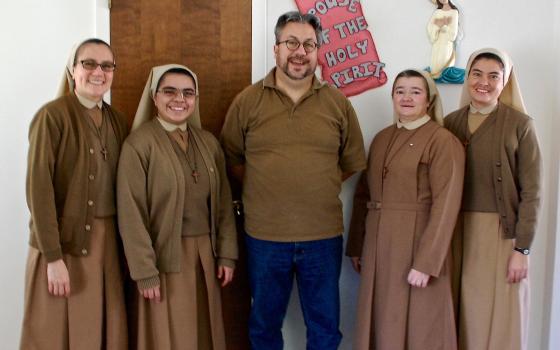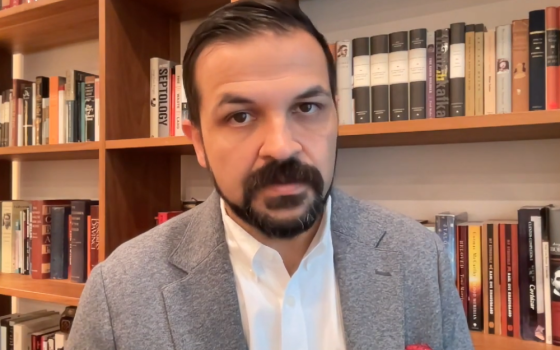One out of every three people raised Roman Catholic in the United States no longer identifies himself or herself as Catholic. Why?
 WHY THE CATHOLIC CHURCH MUST CHANGE: A NECESSARY CONVERSATION
WHY THE CATHOLIC CHURCH MUST CHANGE: A NECESSARY CONVERSATION
By Margaret Nutting Ralph
Published by Rowman & Littlefield, $34
According to Professor Margaret Nutting Ralph, some do not find the worship nourishing. Some disagree with the church's teachings. Others feel they have been marginalized. Others have been hurt by the church's lack of pastoral concern. Still others do not do find the teaching voice of the church credible. What should the Catholic church do -- if anything?
At the very least, the church should attempt an honest dialogue with fallen-away Catholics and try to understand their concerns, Ralph says in her new book Why the Catholic Church Must Change: A Necessary Conversation. Despite the book's title, Ralph uses the word change cautiously.
She prefers instead to equate change with growing in knowledge. She doesn't call on the church to change its teaching -- exactly. The book's bottom line is that the church's core truths need to remain the same. But the applications can be modified in light of scientific and biblical scholarship.
A teacher with 40-plus years' experience, Ralph directs the master's program for Catholics in pastoral studies at Lexington Theological Seminary in Kentucky and teaches in the permanent deacon program for St. Meinrad Seminary and School of Theology in Indiana.
Ralph's latest book offers a compellingly readable discussion of several hot-button issues facing the church. Although the writing needs tightening and questions at the end of the chapters are distracting, the book is balanced, engaging and informative.
Its thesis is that the church needs to rethink issues like the ordination of women, contraception, homosexuality, abortion, marriage and annulment, and some matters of social justice. To make her point, Ralph refers to canon law, papal encyclicals, documents from church councils, and the Old and New Testaments.
She cites numerous instances where the church has modified its thinking in the past. Catholics no longer read Scripture from a fundamentalist approach, for example. Instead, they recognize that the Bible must be read in its context. If a book is written as an allegory, it should not be seen as history or science.
The church has also revisited its stance on issues like ecumenism and collegiality. Pope John Paul II apologized to Galileo and to the Jews. He reached out to the Muslims. Even the church's teaching with regard to the rhythm method is a modification of its previous views on birth control.
Ralph argues that the issue of women's ordination especially cries out for redress. She says that the church discriminates against women based on the Aristotelian notion that females are defective males. She disagrees with the hierarchy's argument that the church cannot ordain women because the New Testament prohibits it. Christ was not a priest, she argues. Neither did he ordain anyone.
Writing as a faithful Catholic -- but not a happy one -- Ralph contends that the exodus from the church didn't just happen because a secular society has run amuck. It was also caused by a hierarchy too rigid in its views and by modern-day Catholics who, like Ralph, are fed up.
 DISCERNMENT: READING THE SIGNS OF DAILY LIFE
DISCERNMENT: READING THE SIGNS OF DAILY LIFE
By Henri Nouwen, with Michael J. Christensen and Rebecca J. Laird
Published by HarperOne, $25.99
Gathered from Henri Nouwen's journals, Discernment: Reading the Signs of Daily Life is the final part of a posthumously published trilogy that aims to introduce Nouwen's thoughts to a new generation of spiritual seekers. (Nouwen died in 1996.) The first volume, Spiritual Direction: Wisdom for the Long Walk of Faith, looked at one's identity in relation to God. The second, Spiritual Formation: Following the Movements of the Spirit, focused on that identity and how movements of the Spirit shape it. This third book, which arguably should have been published first, attempts to show how one can see and connect to the God within all creation.
Focusing on spirituality and bordering on poetry, the book tends to be a difficult read. Edited by Nouwen followers Michael J. Christensen and Rebecca J. Laird, the text is divided into three sections and progresses from the definition of discernment; to finding God in people, places and things; to knowing God's plans for oneself.
The book touches on the work of Henry David Thoreau and Thomas Merton, whose mystical reflections heavily influence this book. The questions following each chapter seem at odds with the text's mystical tone. But ultimately, Nouwen successfully argues that God is everywhere and in everyone. People must make the effort to read the signs of his presence. Hopefully, this book will nudge some of them to do just that.
 THE GOOD BISHOP: THE LIFE OF WALTER F. SULLIVAN
THE GOOD BISHOP: THE LIFE OF WALTER F. SULLIVAN
By Phyllis Theroux
Published by Orbis, $20
In The Good Bishop: The Life of Walter F. Sullivan, Phyllis Theroux examines the instances of moral courage in Sullivan's life. The book started out as an oral history but morphed into a more or less traditional biography. Most of the action takes place between 1953, when Sullivan was ordained, and 2003, when he retired at age 75. Theroux also covers Sullivan's death in 2012, just months before this book was published.
Organized by the issues Sullivan faced, the book is more a loosely written collection of anecdotes than a life story and, as a result, can sometimes be hard to follow. Still, the anecdotes are engaging. The 11th bishop of the diocese of Richmond, Va., Sullivan held liberal views on contemporary issues like prison reform, war, women's rights, homosexuality, and ecumenism.
Sullivan relied on his own sense of right and wrong. This sense led him to build a Holocaust memorial on the grounds of Richmond's Cathedral of the Sacred Heart, establish a joint Anglican-Roman Catholic community, reach out to gays and divorced Catholics, declare nuclear war to be morally wrong, argue against the just war theory, protest the death penalty, promote women to leadership positions in the church, and show mercy to a priest accused -- but not convicted -- of abusing seminarians.
Ultimately, Sullivan followed his conscience even if it put him at odds with the hierarchy of the Roman Catholic church -- which it often did.
[Diane Scharper is the author of several books, including Radiant, Prayer Poems.]



